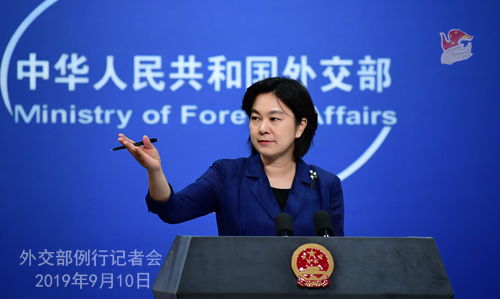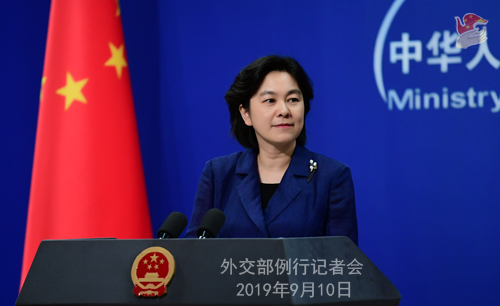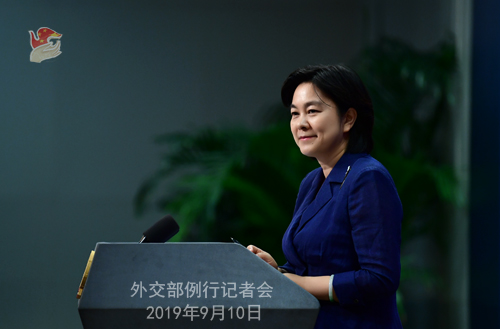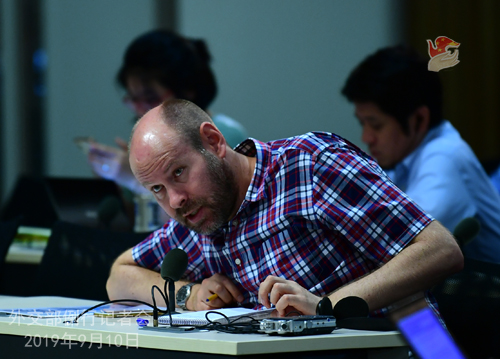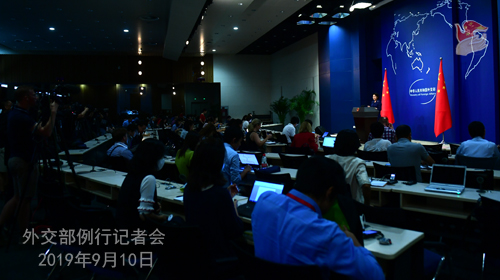| Foreign Ministry Spokesperson Hua Chunying's Regular Press Conference on September 10, 2019 |
| 2019-09-10 23:22 |
|
Q: Media reports said that German Foreign Minister Maas welcomed the fact that Joshua Wong was granted bail and met with him on the evening of September 9 in Berlin. I wonder what is your comment? Have you lodged representation with the German side? Considering Chancellor Merkel's recent visit to China, do you think the German side's move will affect bilateral relationship? A: The German side allowed a Hong Kong separatist to enter its territory and engage in anti-China separatist activities there, and Foreign Minister Maas blatantly approached him. The Chinese side deplores and firmly opposes that. We lodge solemn representation with the German side. Let me stress this again. Hong Kong affairs are entirely China's internal affairs. No foreign government, organization or individual has the right to interfere. The words, deeds and attempts to brown-nose some Western forces for separatist purposes are doomed to fail. It is utterly wrong for certain German media and politician to put on a political show by newsjacking, which shows their disrespect for China's sovereignty and interference in China's internal affairs. During her visit to China last week, Chancellor Merkel expressed explicit support for "one country, two systems" and opposition against violence. We cannot help but ask this question: what is the German side's intention to allow Joshua Wong's entry and activities in Germany and his meeting with Foreign Minister Maas at this particular time? We urge the German side to honor its commitment and not to send wrong signals to the radical separatists in Hong Kong. We also urge Foreign Minister Maas to observe international law and basic norms governing international relations, and to contribute to rather than undermine China-Germany relations. Q: Huawei dropped a lawsuit against US government agencies after Washington released the equipment it had seized for two years. The lawsuit was filed in June this year. I wonder what is your comment on that? A: I noted the media reports. The US government recently released to Huawei the telecommunications equipment it wantonly seized two years ago, which in itself reveals the illegal and arbitrary nature of its misconduct. China firmly opposes the US for making false charges against Chinese companies and for misusing its national power to oppress them. Such practice is disgraceful and immoral, and it runs counter to the principle of market economy, for which the US has been a self-claimed champion. It will severely undermine the reputation and credibility of the US, as well as the confidence of other countries in cooperating with it. As I also noted, Microsoft's president said in an interview with Bloomberg Businessweek that the US government should not take restrictive measures against Huawei when there is no sound basis in fact, logic and law. We urge the US to heed people's rational calls, to stop abusing the concept of national security and oppressing certain Chinese companies, and to foster a fair, just and non-discriminatory business environment for Chinese companies operating in the US.
Q: According to reports, 60 US science organizations recently published an open letter calling on the government to stop oppressing foreign science researchers and obstructing international science cooperation. What's your comment? A: I have noted relevant reports. This is not the first time the US science community voiced explicit opposition to the government's oppression of foreign scientists and obstruction of international exchange in science and technology. Not long ago, about 150 leading US researchers co-signed a letter expressing opposition to the approach taken by the US government and some universities to oppress Chinese and ethnic Chinese scientists. Just a few days ago, President of Columbia University published a signed article questioning the US government's policy targeting international students and scholars. He stated that he is against law-enforcement and intelligence agencies asking universities to monitor foreign students and visiting scholars, including those from China. He believes it is antithetical to US universities' commitment to openness and diversity. Heads of many renowned universities and science organizations in the US have voiced their support for international talent exchange and cooperation in science and technology. They are against US law-enforcement and intelligence agencies' unjust restrictions on China-US exchange in science, technology and education. It shows that greater people-to-people exchange and cooperation is what people would like to see as it serves both sides' interests. We hope relevant US authorities will heed the rational call at home and abroad, stop wantonly restricting and harassing Chinese students and scholars in the US, protect their legitimate rights and interests, and enhance people-to-people exchange with China as well as exchange in science and technology, culture and education with the world. Q: A Chinese national called Zhang Yujing has gone on trial in the United States, accused of trespassing on Mar-a-Lago in Florida. Is the Chinese government providing any support to her in this case? Was she working for the Chinese government? A: Who said she was working for the Chinese government? Journalist: Some people in the United States suspect that she was perhaps working for the Chinese government. She has denied this. Can you tell us whether she was working for the Chinese government? Are Chinese diplomats in the United States providing any consular support for her? A: You said that some in the US suspect that. Lately there have been so many suspicions coming from the US side. But has any single one of them been proved to be true? Certain people in the US are wasting their talent not writing science fictions or making sci-fi movies. In real life, however, their fabrications are just laughable. As to the person you mentioned, I'm not aware of any connection between her and the Chinese government. We ask the US to handle the case justly and properly in accordance with law, and to protect the Chinese citizen's safety as well as her legitimate rights and interests. Q: Speaking at the second West Taihu Global Enterprises Development Forum that has just concluded, Chairman Tim Stratford of American Chamber of Commerce in China (AmCham China) said that the confidence of AmCham China's members in opening up market by the Chinese government is at a historic level. Over half of its members still consider China as one of their top three investment destinations worldwide. Nearly 80 percent members think China's investment environment is improving. Mr. Stratford's remarks are in sharp contrast with the comments by some people in the US that foreign companies are "fleeing China". How do you view these conflicting opinions? A: Basic economics tell us that capital knows best where to invest itself. If you want to know about China's economic condition and business environment, the companies have a say. As AmCham China represents 900 American companies operating in China, its members' view is of extensive representation and speaks volume. In fact, not long ago, a survey result from US-China Business Council showed that 97 percent of surveyed American companies were profiting in China, and that China was one of the most important markets for American enterprises. Eighty-three percent of surveyed American companies said that they hadn't cut or stopped their investment in China in the past 12 months. As repeatedly pointed out by Chinese leaders, China keeps its word on wider opening up. A growing number of foreign companies are getting tangible benefits in China's opening-up process. As always, China welcomes foreign investment and shares development opportunities with foreign enterprises.
Q: On September 7, the third China-Afghanistan-Pakistan Trilateral Foreign Ministers' Dialogue was held in Islamabad. It has been reported that many new outcomes were reached. Could you share more information with us? A: Indeed, the third China-Afghanistan-Pakistan Trilateral Foreign Ministers' Dialogue was held in Islamabad on September 7. This trilateral dialogue was held against a special international and regional backdrop. With surging unilateralism, protectionism and bullying practices in the world, developing countries' interests are facing threats and challenges. In South Asia, there have been some profound and complex developments, including renewed tension over certain disputes left over from history, affecting peace and stability in the region. It is the shared aspiration of China, Afghanistan and Pakistan to maintain peace and stability in the region. The three countries would like to advance BRI cooperation, enhance regional connectivity, realize sustainable development and improve people's lives. With the aim of maintaining peace and stability and promoting development and prosperity in the region, this dialogue focused on deepening cooperation in economy, trade, culture, connectivity, BRI and counter-terrorism such as ETIM forces. State Councilor Wang Yi talked about the outcomes of this dialogue at a press conference. We believe five important consensuses were reached. First, the three sides spoke highly of the outcomes of this dialogue. They believe the China-Afghanistan-Pakistan cooperation, as a new type of sub-region cooperation, goes with people's earnest aspiration for peace and development. Distinctively equal-footed, open, practical and efficient, it is brimming with vitality. Second, the three sides hold that the situation in Afghanistan has come to a critical point and call on foreign troops to withdraw in an orderly and responsible manner. China hopes to see reconciliation between the Afghan government and the Taliban reached through peaceful negotiations. We call on all parties in Afghanistan to start internal negotiations following the "Afghan-led and Afghan-owned" principle as soon as possible, and to explore a political arrangement acceptable to all so as to realize peace and start reconstruction at an early date. State Councilor and Foreign Minister Wang Yi proposed the following three principles on the future political arrangement: it should be of broad representation and inclusiveness; it should be steadfast in counter-terrorism efforts; and it should follow foreign policies featuring peace and friendship. This is a solution to the Afghan issue from a Chinese perspective. Third, the three sides believe that better Afghanistan-Pakistan relations are significant for peace, stability and development in the two countries and the region. They spoke positively of the two sides' fruitful efforts towards amelioration since the launch of the trilateral dialogue. China commends the political backbone and courage of the Afghan and Pakistani leadership and will continue its support and assistance for the two countries in holding dialogue, improving relations and strengthening cooperation. Fourth, the three sides agreed to explore ways to advance trilateral cooperation under the framework of BRI cooperation. They will enhance connectivity, extend the China-Pakistan Economic Corridor to Afghanistan, and work with global partners to construct a motorway connecting Kabul and Peshawar. They will work together to improve livelihood by implementing previously-agreed projects such as drinking water supply schemes, refrigeration storages, clinic centers and immigration reception centers at crossing points between Afghanistan and Pakistan. They will also deepen people-to-people exchange with communication and training programs involving diplomats, archaeologists, Red Crescent Societies, media and think-tanks. Fifth, the three sides will deepen security and counter-terrorism cooperation. They agreed on a list of projects to implement the MoU on Cooperation in Counter-terrorism and agreed to step up cooperation in areas such as counter-terrorism capacity building and counter-narcotics. They will also enhance intelligence-sharing and law enforcement cooperation and continue the resolute fight against ETIM and other terrorist forces. A joint statement was issued, giving a full account of the consensuses and deliverables. China stands ready to stay in close communication with Afghanistan and Pakistan to implement the consensuses reached at this dialogue. Q: The DPRK again launched two projectiles this morning, which is the eighth time since July. How do you view the impact of the DPRK's frequent missile launches on regional security? A: I noted the reports. I hope the relevant sides can reduce differences and address their legitimate concerns through dialogue and consultation, and continue to advance denuclearization and the establishment of a peace regime on the Peninsula.
Q: The Solomon Islands' foreign minister is currently in Taiwan. In a press conference in Taipei yesterday, he said everything was normal in the relations between Solomon Islands and Taiwan. Has China invited the Solomon Islands' foreign minister to visit Beijing? Does China have a timetable for when China and the Solomon Islands may establish diplomatic relations? A: As is known to you all, there is only one China. The one-China principle is an international consensus and an overwhelmingly supported historical trend. The correct choice is to follow this trend, which has already been done by most of the countries. China is ready to develop friendship and cooperation with all countries following the one-China principle. Q: Further to what you said about the China-Pakistan-Afghanistan Trilateral Foreign Ministers' Meeting, you said those countries that have troops in Afghanistan should withdraw in an orderly and responsible way. The United States has now called off its talks with Taliban and there seems to be a prospect where the US troops are going to stay in Afghanistan for a longer time. How does China view the Taliban attacks that actually thwarted the peace talks that were taking place between the US and Taliban? A: The foreign troops should withdraw in an orderly and responsible manner, meaning that the arrangement should be conducive to Afghanistan's peace and reconciliation process. As for the recent US announcement of canceling its meeting with Taliban representatives, for some time, negotiation between the US and Taliban achieved important progress, and the two sides reached principled consensus on a peace agreement. Though there are quite some uncertainties in Afghanistan's peace and reconciliation process, cease of war and realization of peace is the call of over 30 million Afghan people and the aspiration of people in the region and beyond. China firmly supports the broad, inclusive peace and reconciliation process that is Afghan-led and Afghan-owned. We support more dialogue between relevant parties and encourage the US and Taliban to advance negotiation for tangible outcomes, so that peace will be long-lasting on the Afghan soil and conditions will be created for the ultimate settlement. Q: According to media reports, Italy arrested an employee of Russia's United Engine Corporation in an airport at the request of the US, who accused him of "stealing" trade secrets. Russia condemned the US move as a "really bad practice" and demanded that the US withdraw its extradition request. Do you have a comment? A: We note relevant reports and comments from the Russian side. We hope it will be handled based on facts and law. I must point out that this case is nothing new for us. The US engaged time and again in arbitrary detention of foreign nationals to oppress foreign companies in total disregard of international law and basic norms governing international relations. Such misconduct, inciting more and more indignation and opposition, undermines mutual trust and cooperation and disrupts people-to-people exchange between countries. We hope the US will correct its wrong practice. Q: My first question, Hong Kong Chief Executive Carrie Lam has urged the US not to interfere with her government's handling of the Hong Kong affairs after Sunday's protest where people marched to the American embassy to hand over petitions. How do you react to this? Second, a US-based organization for protecting journalists has ranked China among the ten worst countries for journalists to work. How do you comment on this particular ranking? A: On your first question, our position is clear-cut. China firmly opposes interference in its internal affairs by any foreign government, organization or individual. They should stop playing dirty tricks on Hong Kong immediately. On your second question, I haven't heard of the organization you mentioned. How well does it know China? Have any of those who made such judgment been to China before? As foreign journalists in China, do you agree with them? Have you encountered difficulties in your life and work in China? I can see you are enjoying your stay here, aren't you?
|
 |
|
